40 Acres
Spoilers from 20 years from now…
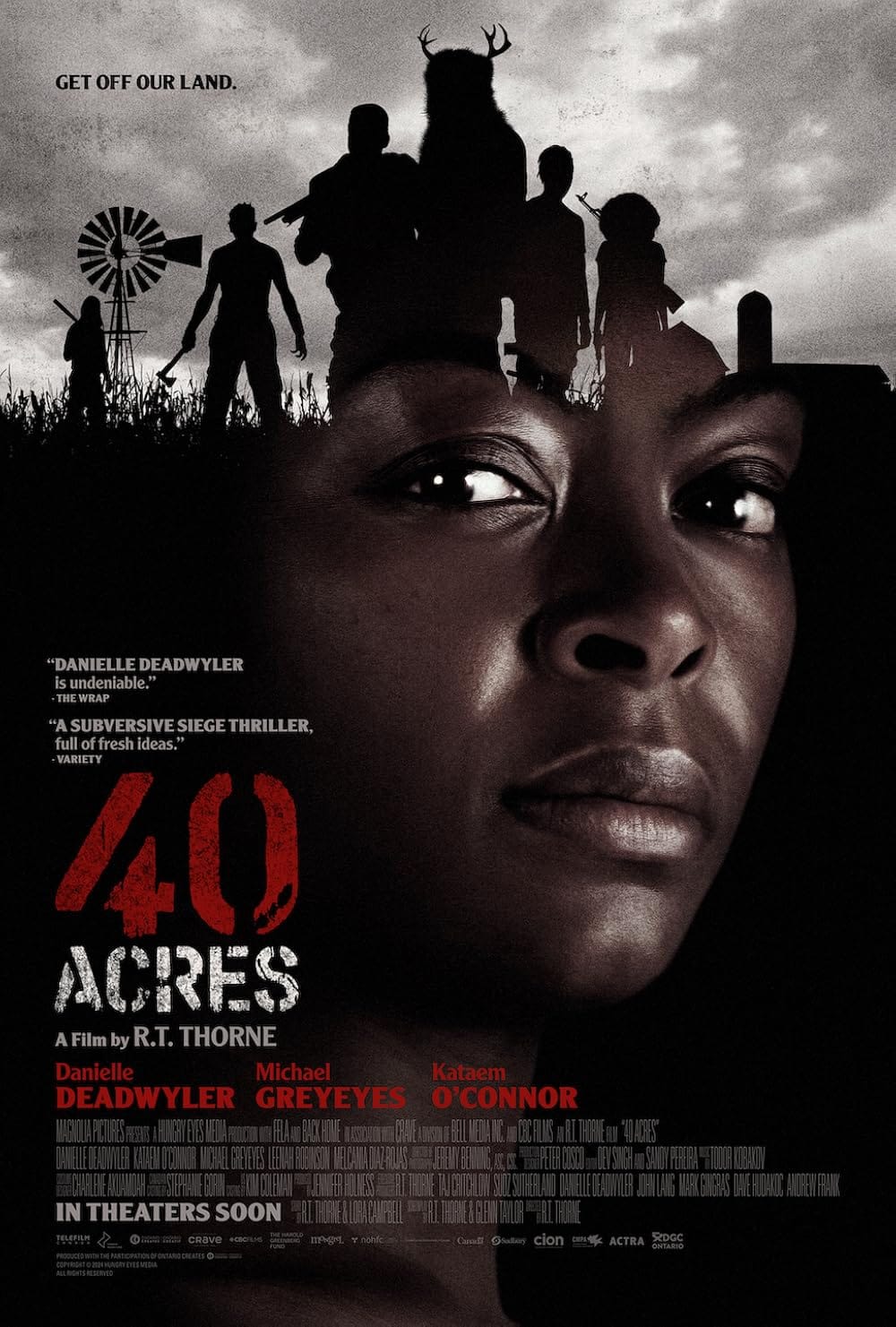
After a series of plagues and wars leaves society in ruins, the Freemans are surviving, even thriving, despite the occasional raiding party, on an old family farm in the middle of nowhere in rural Canada. Former soldiers, Hailey, and her partner Galen, keep the farm along with their children, training them to fight and kill in order to protect each other and what’s theirs. But now, Hailey's eldest son, Manny has grown into a young man, with all the concerns of a young man, so when he meets a young woman in the forest, his desires put his entire family in jeopardy.
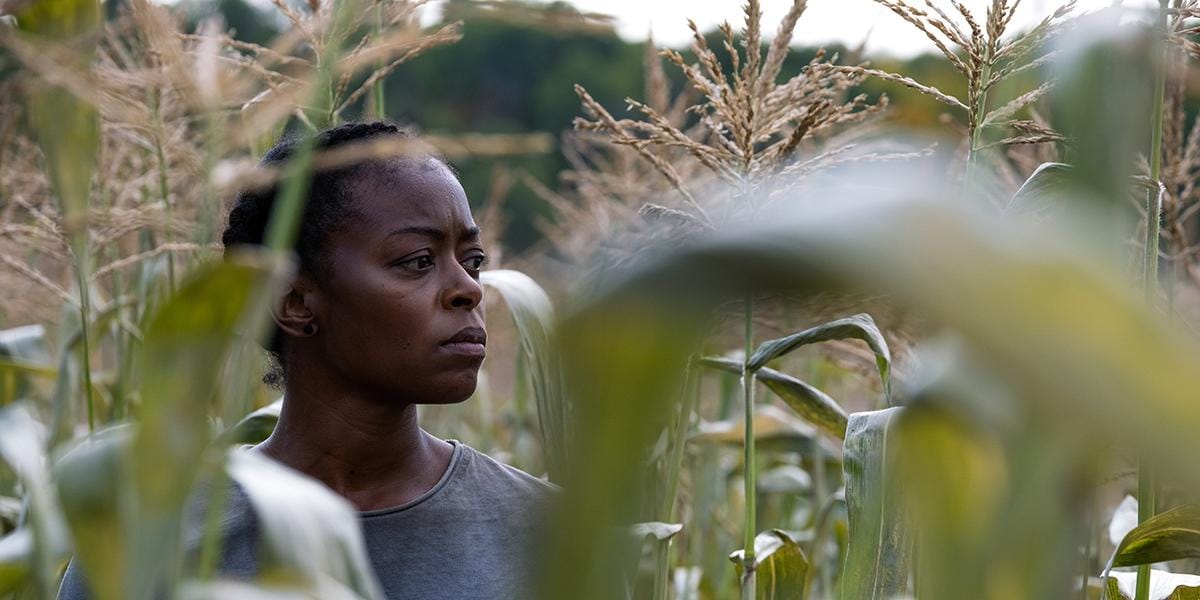
The film begins with…
14 years ago, a fungal pandemic decimated 98% of the animal biosphere. 12 years ago, a second civil war broke out as a result of a global food chain collapse. 11 years ago, famine spread across the planet. Now, the most valuable resource is farmland.
The Freemans are a tight knit Black and Indigenous family group living an isolationist existence on an isolated farm. The farm presumably spans 40 acres, and has been in the Freeman family since 1852, ever since an ancestor escaped slavery in the American South to flee to rural Canada. As fertile land is now the only thing of value in a world that is largely without it, as well as animals, the farm is hemmed in by high electrified chainlink fencing, barbed wires, and cameras, and protected by the family. There’s a large farmhouse, a larger barn, a garage, maybe a few sheds, and some verdant fields. The larger buildings are all connected by tunnels and a strong, well-stocked bunker.
Raiders killed Hailey’s father and all his people over a decade ago, and now the farm belongs to Hailey and her people. Hailey is the matriarch, and her partner Galen is right there with her. They’re former soldiers who fought in the Second American Civil War, and have since left the world behind. The Freeman children are Hailey’s son from a previous relationship, Manny, the oldest. Next is Raine, a teenager who is Galen’s daughter from a previous relationship. Then there's the two girls by Hailey and Galen, just coming-of-age Danis and the baby Cookie.
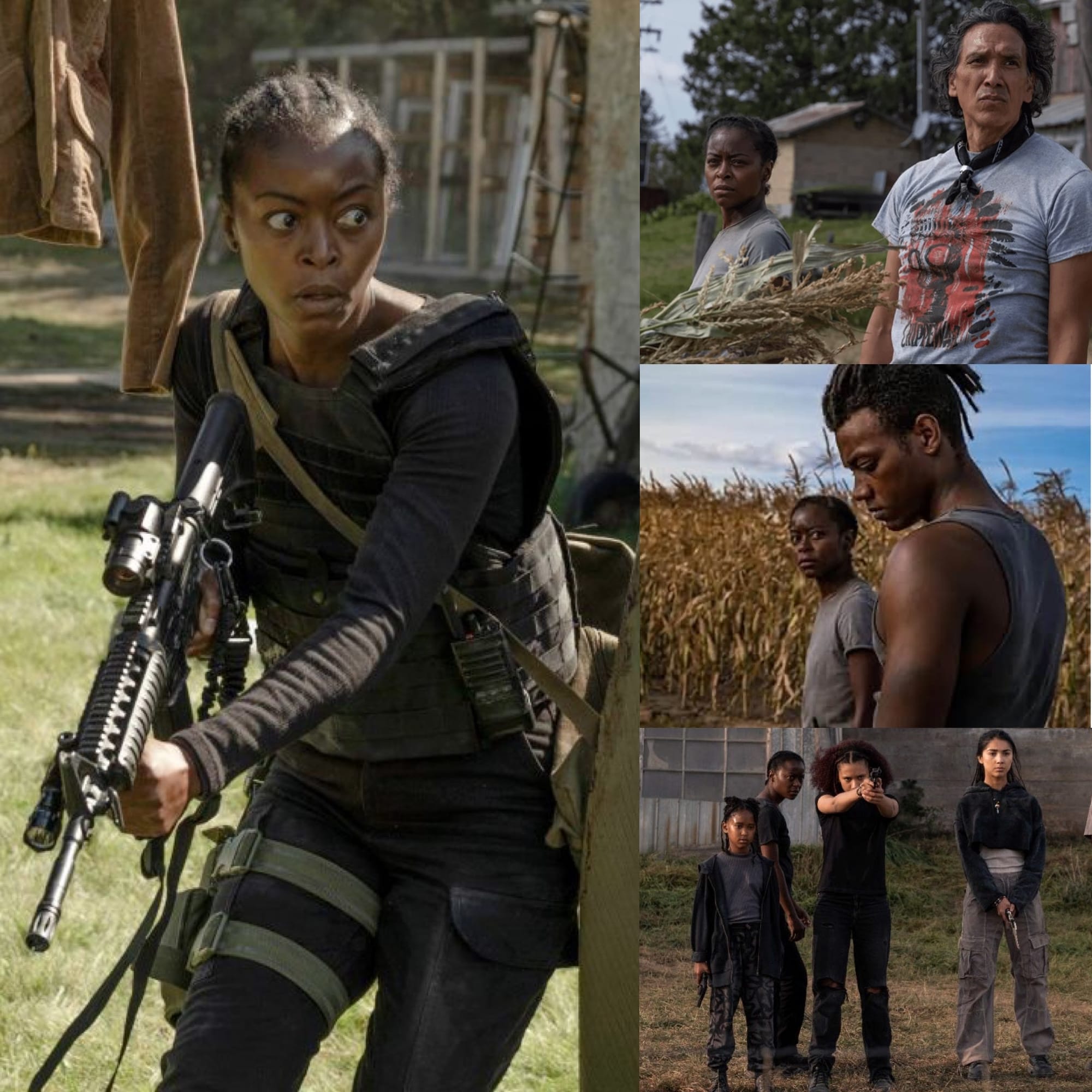
They tend to the land. They defend the farm, and each other.
The movie begins with a dozen or so heavily armed (mostly white, mostly male) raiders as they cut through the fence, and creep through the cornfield towards the farm. They move quietly and confidently. They look like men who have been living rough in this new world, surviving through violence, and by taking what they want. They definitely look like they’ve done this before too, as they spread out amongst the farm’s building. A line of them all face the main house, and the group’s leader calls out in the familiar tone of a patronizing asshole, who is savoring the pain he is about to inflict, that it would be a shame to let the farm’s abundance go to waste without sharing some of it with them.
The Freeman’s answer with a hail of bullets from hidden spots. Several of the raiders are cut down. The ones who snuck into the barn are stabbed to death by unseen assailants. The rest of the raiders turn and flee back through the cornfield, but all they find is more death waiting for them amongst the stalks. The Freeman’s make quick and brutal work of these men.
None of them escape.
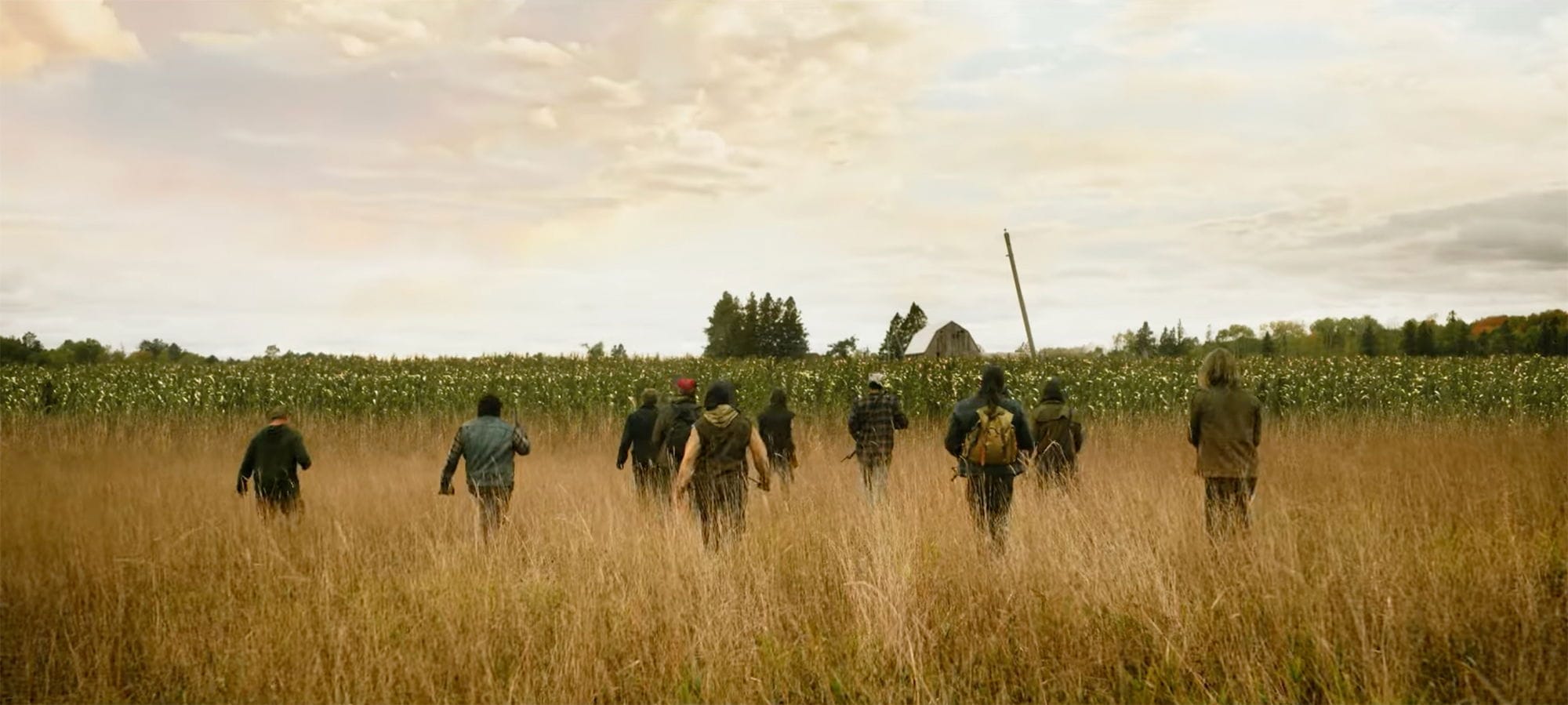
It’s clear that the whole family are not only total badasses, they are a cohesive fighting unit. Together, they seem almost unstoppable. But that said, you can tell right away that, even as good as he is, Manny is the weak link in the chain. He’s gonna be the dumb one here. And its good bet, judging from the fact that there’s no women on that farm he isn’t related to, that as soon as he sees some unrelated boobies, he’s gonna get real stupid, real quick.
After cleaning up after the fight, we see the daily routine of life on the Freeman Farm. They spend their days tending crops, undergoing hardcore combat training, and learning about the traditions of their ancestors. Each night around the dinner table, there’s laughter and love, and the kids report on books assigned to them, but discipline and manners are enforced as a matter of course. Hailey is strict, and she runs her family like a military unit. These kids say “yes, ma’am” and yes, sir.“
But she does it this way because the times are uncertain.
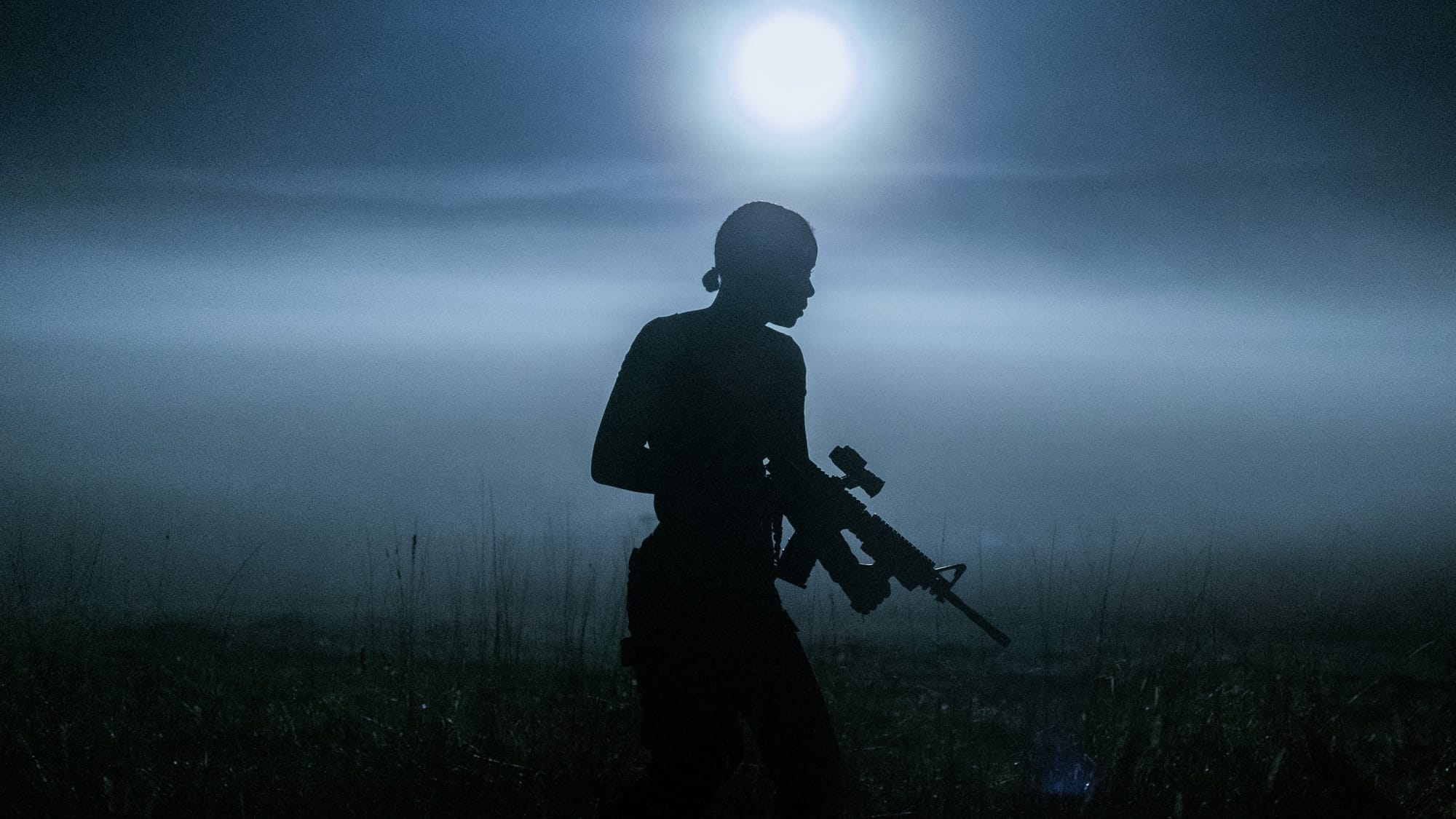
Hailey has seen the world outside of their 40 acre plot, and it’s shit. There’s still some governments out there, supposedly, but Hailey was there during the collapse of society. She fought in the Second American Civil War. She saw the famine and the fires. She saw white American Christians and their constant public executions, the bodies hanging from street poles. She saw whole suburbs on fire. All of it done out of fear, and in the name of god.
Down in the family’s bunker, she keeps track of their perimeter through their cameras, and keeps tabs on the other farms in the area through her CB Ham radio, listening in as the other farms struggle with the constant threat of starvation and raiders. She listens, she hears their need, the brittle sound of their voices, and she stays quiet, because she knows what people are capable of when their situations take a wrong turn.
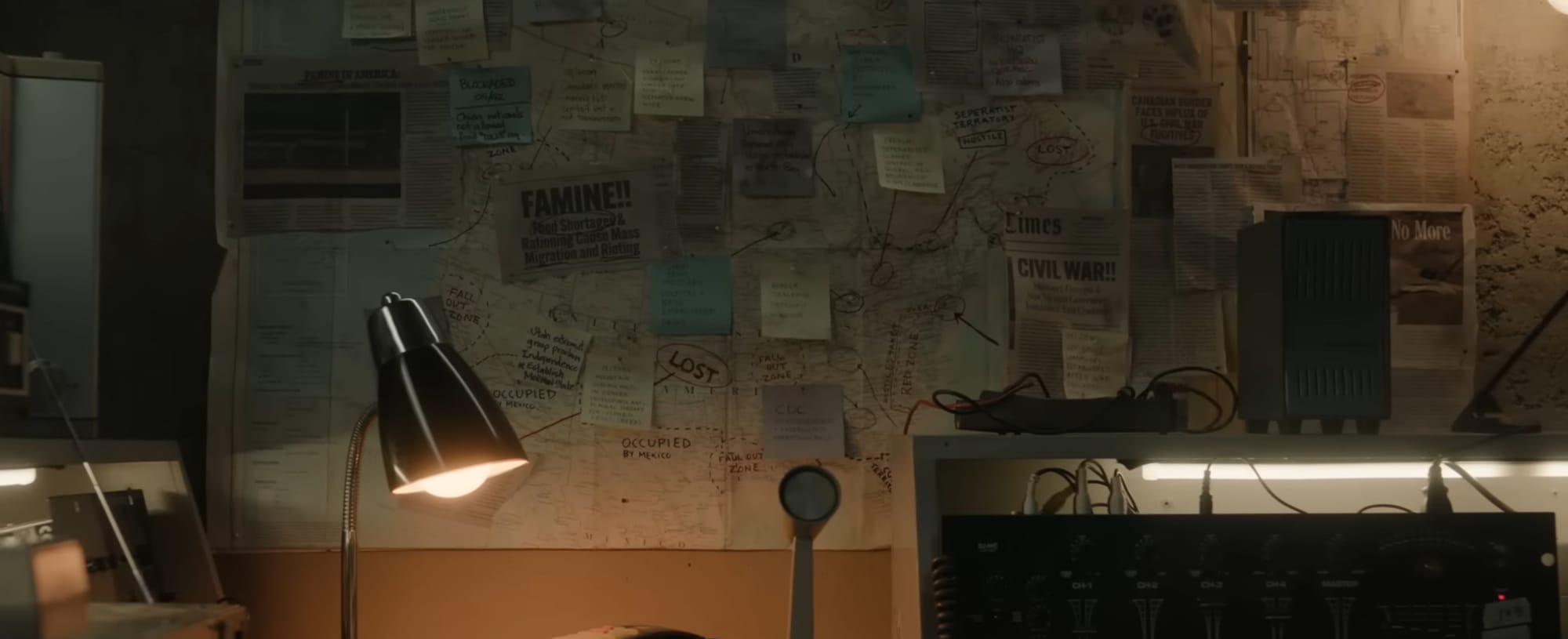
But other than her nightly eavesdropping on the radio waves, as well as a blind drop style trade of her weed for some moonshine made by a woman named Abigail Taylor, who runs a close-by farm, Hailey has no use for the white man’s god, or the white man’s world. Instead, she focuses solely on the home place and only on the home place. Hailey understands, in times like these, if you have a homestead, then it’s best to keep it secret. But while this isolated life suits Hailey just fine, because she has everything she needs on that farm, Manny and Raine have begun to chafe, as any teenager would.
Still at the same time, it’s clear that the rules have not only kept them all safe and sheltered, but unlike so much of the rest of the world, they are well-fed, loved, and happy. And these rules only become more important as, from listening to the CB, and occasionally chatting over the airwaves with Augusta Taylor, Hailey finds out that some of the other local farms have recently gone dark, more and more, one by one too, and while yeah, the individual situations at those farms were precarious, so it could be the result of all sorts of things, getting confirmed news of why exactly this is happening is becoming harder and harder to come by, and all while vague reports of bandit attacks have been increasing. There’s trouble in the air.
Even worse… there’s talk of cannibals.
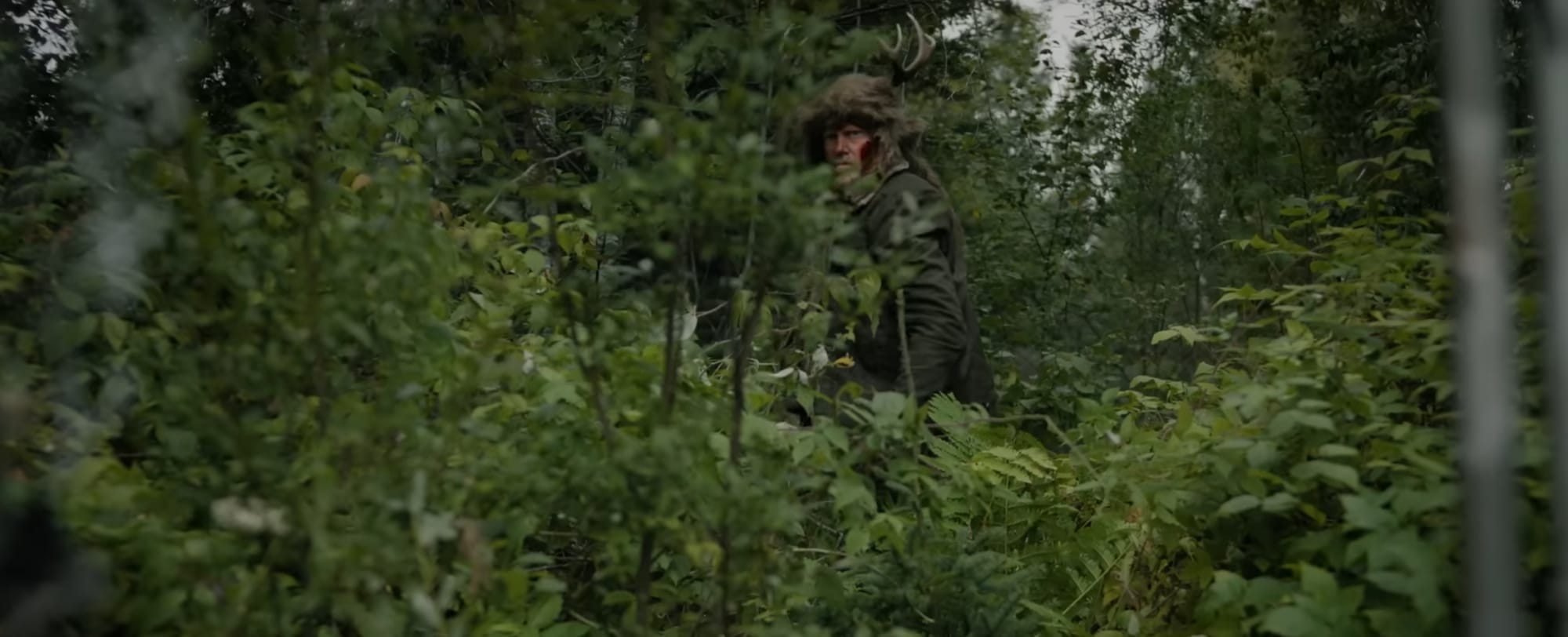
But unfortunately for everyone, Manny has a boner.
Y’see, one day, he was sent to pick up the blind drop and leave their end of the bargain—weed for moonshine—and he paused along the way to swim idly in the river. While there, he sees a beautiful young woman swimming in a tank top and a tiny little pair of underwear. Instantly twitterpated, he follows her all the way back to the Taylor farm, where she’s staying, and watches from a distance like a creepy stalker, even though it means he stays out too long, and gets in trouble for missing his siter Danis‘ coming-of-age celebration. But he just can’t think straight now, all the blood in his head is now in his penis, and soon he is spending all his free time furtively drawing fairly decent illustrations in his little notebook of the young woman in her underwear.
Then, when Hailey sends Manny with Galen and Danis on Danis’ first mission outside of the farm, as she is now of age, to show her where the blind drop with Augusta Taylor is hidden, they discover that the place has been compromised. There’s a bunch of dead bodies hanging from the ceiling, and a group of people there who claim they’re from the Union (which is implied to be a remnant of the U.S. Government that is still trying to maintain order) but in actuality, they’re all cannibals, and not the fine young kind either.
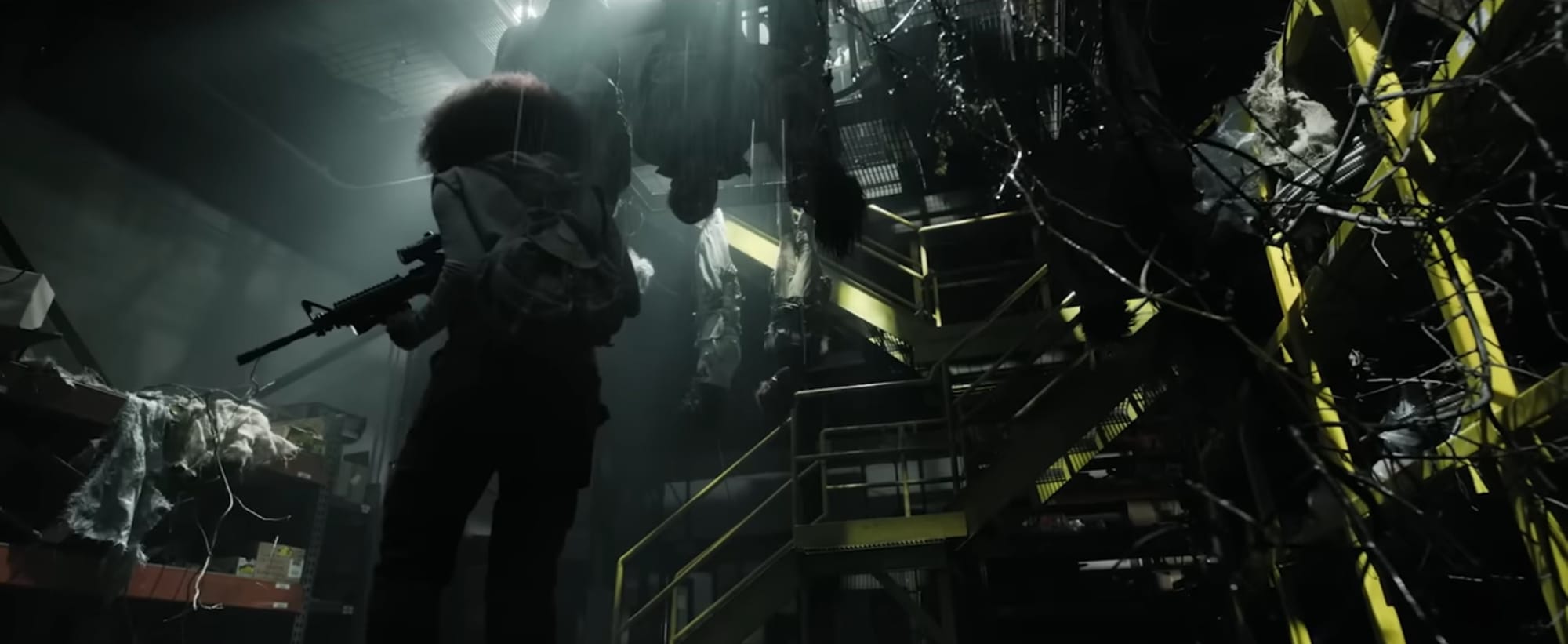
There’s a firefight, and one of the people Manny shot didn’t die, and while they’re checking the other bodies for information and loot, Danis gets shot by the survivor. She survives, and is laid up and slowly recovering, but it was dicey.
Hailey becomes more concerned and paranoid about what is happening on the local farms, so she tells the family they’re now on High Alert, and to shoot anyone who comes to their fence. Unfortunately, when Manny discovers the same young woman from the river is now bloody and begging for help at the fenceline late one night, he hides her in the barn, instead of listening to his mother.
There’s only six people on this farm, and only like… 4 different places to go, so it doesn’t take long for literally everyone to notice that Manny is acting weird, and keeps sneaking out to the barn. So Hailey and Galen go out there, and find Manny and the young woman, who is shaking her money-maker while Manny watches, and is named Dawn. Needless to say, Hailey is not happy about this, and grabs Dawn, breaking Manny's walkman in the process.

Dawn claims that she’s a nurse with the Union, sent with a unit of soldiers to support the local farmers. She claims that raiders hit the Taylor farm, where they were staying because Augusta Taylor is her aunt and told her the Freemans would help, and now she begs the Freemans to help her check on her people. But because of what happened at the blind drop, Hailey does not trust her, believing her to be a raider scout, and wants to kill Dawn and then lock the farm down. Unfortunately, before she can do that, Manny runs, taking Dawn back to the Freeman farm, and guess what…
Straight into trouble.
After that, it’s up to the family to come together and either start killing them some cannibals, or it looks like meat’s back on the menu, boys.
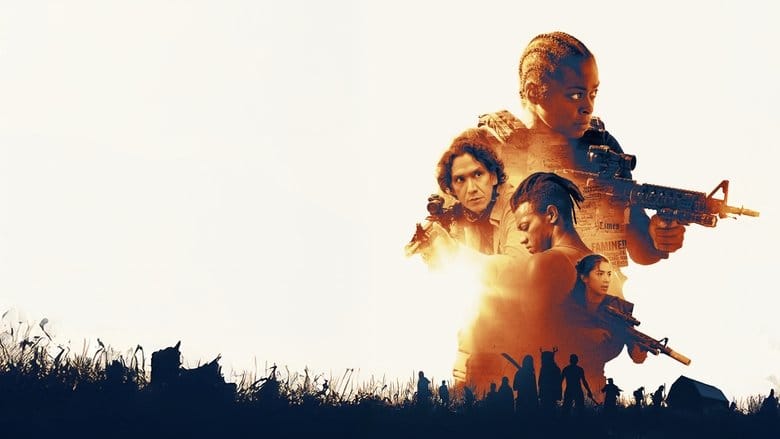
Broken up in five sections: The Freemans, The Boy, The Girl, Augusta Taylor, and The Family, 40 Acres is a Canadian post-apocalyptic thriller written and directed by R. T. Thorne. This is their writing and directing feature debut, as they’ve mostly done TV and music videos before this, which is kind of apparent when you watch the film. That doesn’t mean that it’s bad, it’s just that the film looks and feels a lot like a sci-fi tv show with occasional music videos scattered throughout.
My main takeaway here is that I really thought 40 Acres was going to be much more of a post-apocalyptic cannibal horror movie. This is all due to the “cannibal siege“ movie impression that the trailers give, so I was really expecting this film to be a lot more horrifying, at least as far as the blood and guts aspect is concerned. I mean… there's a nice family, some cannibals show up, when it comes to the post-apocalyptic cannibal movie genre, these things aren’t usually what you’d call subtle or reserved, but yeah… 40 Acres is not a horror film at all. While it has decent gore, 40 Acres really is more of a sci-fi action movie than it is a horror film. Honestly, as far as the story is concerned, it's really not that far from a pretty standard YA Sci-fi Romance tale too.
It’s good. I’m not saying this a bad thing. I really enjoyed the film.
It’s just, I was expecting more of a “The Hills Have Eyes” meets “Texas Chainsaw Massacre“ meets “The Road” kind of thing, a little more brutal, y'know? And what I got instead was much closer to… Divergent meets Hunger Games? But like, also a kid’s zombie movie maybe? It reminded me a lot of the TV show The 100, which I loved, and watched every episode, but it's like... CW TV show brutal, y'know? And that means... not brutal at all. Like I said, it was good, but the downshifting from expectations to reality was jarring.
So, fair warning.
Also, the intended message behind the Freemans all being Native and/or Black, and the raiders and cannibals pretty much all being white is pretty obvious, but in the end, this metaphor is ultimately pretty ignored.
The trio of writers, R.T. Thorne, Glen Taylor, and Lora Campbell, are obviously aware of the history behind the surname “Freeman” when it comes to formerly enslaved people, and it’s just as obvious that they chose it for that specific reason. The term “40 Acres“ comes from the promise made by General Sherman after the Civil War to provide formerly enslaved people with land and a mule as a kind of reparations for the crime against humanity that is slavery, a promise that was then broken by the bigot fuckhole beloved by stupid racists, Andrew Johnson, the 17th President of the United States. The writers are also clearly aware of that history, and that’s obviously why they chose it as the title of the film. Both terms bring a significant meaning to the setting and the characters, and the reason why they’re using them is clear, and it’s not a bad thing to use these references so simply and clearly, it’s just that it’s also not that deep of a thing. The same can be said of the way the film owes an obvious debt to Octavia Butler’s Parable of the Sower. It’s clearly a touchstone for the film, but that’s all that it is, a touchstone, more like an “inspired by” credit than an actual part of the story. Like I said, it’s fine how they use these things, and it does provide an extra layer of meaning, but at the same time, it’s a little disappointing that it doesn’t go any deeper.
And because this metaphor is ultimately pretty surface, you end up focusing less on what the story has to say, and more on the story itself, and the world that it inhabits, in short... the details.
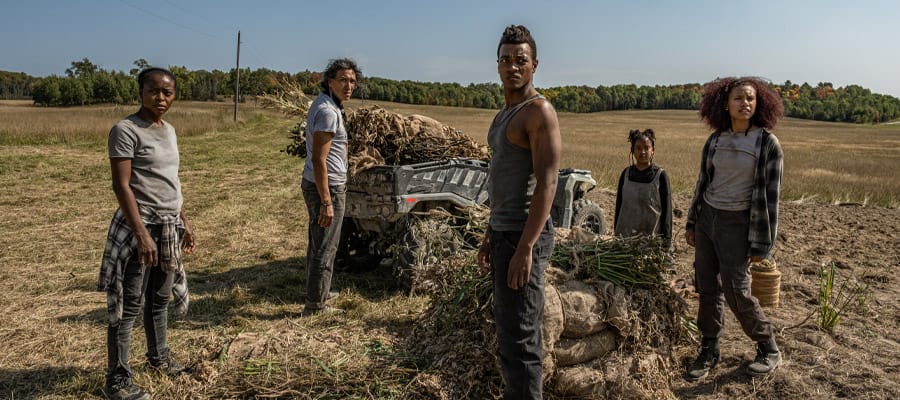
And that's where there's some issues.
They’re all little things, sure, but they’re also genre nerd things, so they bug me. Like how Hailey tells Cookie “don’t waste bullets and to use her blade” after they take out that first gang of raiders, but mere moments later, she tells Manny to take care of the last raider, who is bleeding out, and Manny shoots them, but Hailey doesn’t say anything about it. Also, not only does Manny regularly linger too long outside the walls with zero consequences in a movie where it’s supposed to be so dangerous out there, but also, when Hailey sends him or Galen out on runs for the farm, they go alone, and that just seems… really unsafe. Why not as a pair to watch each other's backs? This makes even less sense coming from a former soldier. Also, during the film’s climax, the heroes survive way too many stab wounds. And on top of all that, while the characters are all obviously vegan in this world, as there’s no animals anymore... where do they get their protein? Especially as they very clearly eschew the long pig?
I get that this stuff is really all nonsense “issues.” I get that. And obviously, who really cares about but me, right, but I do think about this stuff, and I wish I saw more creators in these genres spaces doing so too.
I guess, to be fair, at one point, we do see Galen and Danis dig up what appears to be a truffle, but this is my point... I don't want the film to show the family pooping, but seriously... where is their toilet? Is it an outhouse? Or do they have a working pump? Come to that, do they have a well? I assume they do, just like I assume they use solar panels and/or wind turbines, but I don’t actually know. We don't see any of it. How exactly do they get their electricity? It seems like that would be an issue, as would fresh lightbulbs after twenty years, right? What about gas? Their vehicles don't appear to be electric, so where is the gas coming from? How exactly did they build that bunker? Or was it something her father built?
One thing that lingers like a bad smell around this movie is the feeling that it was adapted from a YA novel that you haven't read, and as a result, a lot of the more casual worldbuilding details were left out of the movie adaptation, but this isn't the case. 40 Acres is an original story, so these holes in the worldbuilding were either forgotten, not thought about at all, or worst of all, were deliberately handwaved away because it was just too hard to explain otherwise, and besides (much like the Walkman that has a mixed tape that contains songs that were released long past the era of CDs had passed) the romance of certain imagery was just too much of a darling for them to kill. That's disappointing stuff. I want those untidy little details of these fictional worlds to be cleaned up, or at least have the meat of the tale be so rich that I don't give a shit about some messy little corners. I'm more forgiving of similar issues in Sinners, because what the film had to say was interesting and powerful and really well-done, so who cares about little stumbles.
Here, they stick out, and bug me.
And before you ask about the bullets, they are shown gathering spent casings, which implies that they’re handloading, so that’s cool… AND… the way that they do this in the film is a great example of how you can actually answer silly questions like mine without giving them an undue amount of attention in the film. Besides, I'm not expecting them to be living like Mad Max after twenty years, I'm expecting things to look more like they've had no choice but to adjust by now, because shit isn't being made anymore, shit is running out, and you can't be reliably scavenging after nearly 20 years, so you have to be creating more, and you should see this in the clothing. Which is my point... by this time in this world’s apocalypse, it’s fair to say that manufacturing would be basically nonexistent, and while this might not be totally true, it would definitely be true for luxury items, right?
So...
This means that Dawn’s blue flower-adorned bikini panties have to be at least 10 years old. At least. If not more like 20. Also, they most likely belonged to at least one other person before her, if not more than that. She didn’t get those bright blue butt-huggers from the sale table at the Victoria’s Secrets! She’s supposed to be in her early twenties, so that means most of her life has been lived in the apocalypse. She’s never been to an Wal-Mart, and if she has been in one, it was probably more a community flea market that was using the shell of an old Wal-Mart as protection from the raiders and rabid Christians, since the Waltons had long ago abandoned the surface world at this point to hide out deep underground in their secret luxury bunker outside of Bentonville, Arkansas, and have probably all eaten each other down in the blood-splattered darkness of their bunker by now anyway! This means that she’s wearing someone else’s underwear! Because it’s the apocalypse! That’s basically the definition of what an apocalypse is… a period of time where you have to wear other people’s underwear! It’s fair to say that it's one of the reasons why the Apocalypse sucks!
So here’s the problem… Her panties did not look threadbare from years of use, or stained after whoever wore them last died horribly somehow while wearing them and shit themselves as it happened. They also didn’t look too oft-washed due to all the death shits of the various previous owners either. They looked new! And that’s the problem… where do you get new panties in the apocalypse? Now, is any of this an actual problem? No. Yes. Whatever. Either way, details matter, right? If they had given her a pair of yellowing and saggy granny panties with a big hole in one cheek instead, no one would've said anything, because as a detail, it would have then fit smoothly with the entire fictional world. But... instead, the panties are a microcosm of this whole issue I'm going on about–perhaps at too great a length–as it's clear that a pair of raggedy-ass granny panties are just not sexy, but little flower-adorned, blue bikini panties are. Just like it's also clear that the filmmakers are going for a whole "Aphrodite emerging from the water" moment here. So, this is what they went with, viability be damed.
That's disappointing to me.
Especially when you also consider the fact that Manny would probably be attracted to any half naked woman he sees that isn't related to him, and that they don't need to be a more socially acceptable version of Aphrodite, with her freshly shorn armpits and brand new panties.
But like I said... CW TV show shit.
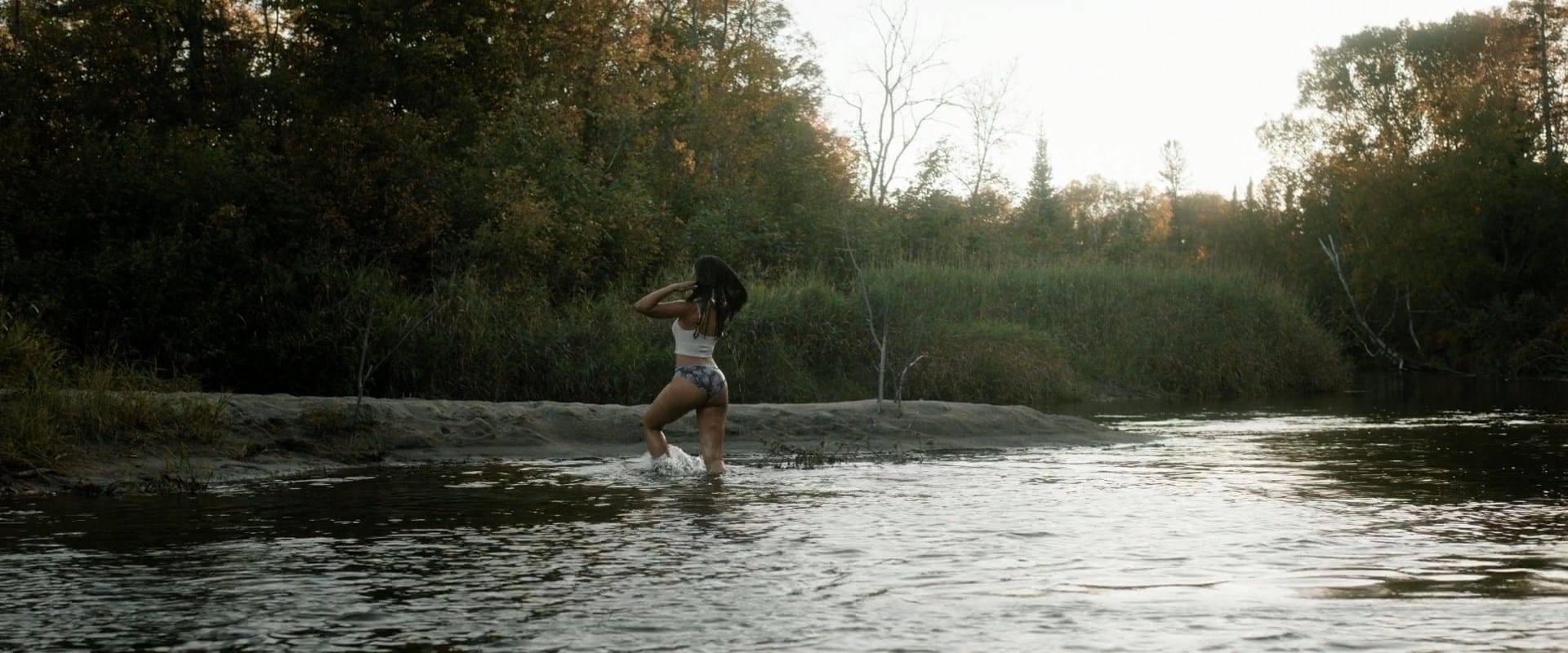
But I digress… obviously this is all nonsense and nitpicks.
So, whatever… all that shit aside, 40 Acres does do a good job of juggling its multiple themes, the war between tradition and change, the push and pull between a parent and a child as that child starts to grow up, the value of found families, and of course, the beauty of protecting your community by kicking the asses of the ugly monsters who want to harm it. I loved the inclusion of Black and Indigenous lore, and the human moments of levity and joy perfectly fill in who these characters are, while also illustrating how much they mean to each other, and also endearing them to us, making us want to root for them. Plus, the action really is great. Galen’s knife fight in the dark is really fun, and the opening sequence is not only really cool, and very satisfying, it does a good job of giving us a glimpse into the larger plot and the coming conflicts.
Now, while some might say that the film’s resolution is a bit too neat, and maybe too bloodless, as the Freemans don't really lose anything, and actually come out better in the end—and they wouldn’t be totally wrong in saying this either—I still think it’s fine. The characters deserve it, and personally, I'd much rather see POC characters win over shitty white people right now, at least when it comes to my entertainment. But that aside, why shouldn’t the heroes triumph in these kinds of stories? Especially when they put in the work, right? It's just better that way. Right now (gesturing around at the world), who really wants to watch a movie just to see the good guys lose, or the hero die at the end? Bah. Also, this ending seems very much in line with what the very relevant message of the film is...
The only way you survive these kinds of crises is with a strong community.
So, 40 Acres is definitely not what I expected, and sure, it's really more fun and “not bad,” then it is “great“ or all that daring or unexpected, but I still enjoyed it. If you like post-apocalypse adventures, then this one is worth a watch.
